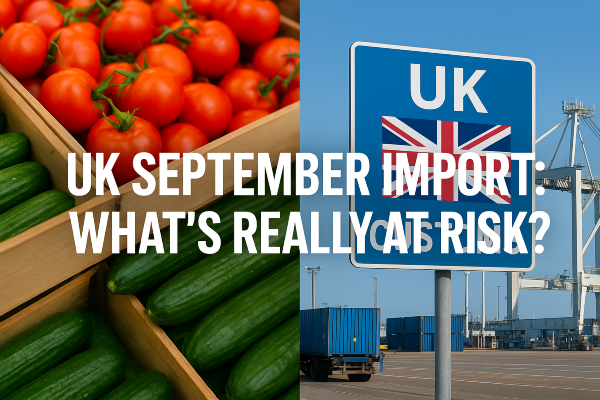When the UK government hit pause on new post-Brexit border checks for agri-food, the decision was pitched as a way to keep costs and red tape down. But the timing wasn’t random. September is one of the most sensitive months in the fresh produce calendar — when Britain leans heavily on imports of salad vegetables and fruit just as domestic supply ebbs.
Why September matters
Britain still imports around 40% of its total food. For fruit and vegetables, dependence is even sharper: Spain and the Netherlands are the backbone of supply through late summer and early autumn. Domestic growers face higher energy costs in greenhouses, and the transition from summer crops to autumn planting leaves gaps. That makes September a pressure point where trade friction can quickly translate into shelf prices.
The government’s calculation is obvious: adding full border checks right now would risk delays at ports, higher logistics costs, and potential gaps in supermarket ranges. With inflation still a live issue, that’s not a gamble ministers wanted to take.
The September basket
So what exactly is in Britain’s import basket at this time of year?
- Tomatoes and Peppers: Spain and the Netherlands dominate supply as the UK’s own crop winds down. These “shoulder-season” imports bridge the gap between summer fields and heated autumn greenhouses.
- Cucumbers: Britain is one of the world’s largest cucumber importers, with Spain and the Netherlands again providing the bulk. Domestic growers face steep energy bills for heated tunnels, leaving imports as the default.
- Grapes and Citrus: Early autumn brings in Spanish and Italian table grapes. South African citrus also fills shelves before Moroccan and Spanish volumes build later in the season.
- Salad leaves and greenhouse lines: These are a volatile mix. In good weather, the UK can cover more of its own needs, but a cold snap or heavy rain quickly shifts supply to continental Europe.
Each of these categories is fragile: perishable, high-volume, and central to everyday meals. A customs hiccup doesn’t just inconvenience importers; it shows up instantly in lunchboxes, sandwiches, and salad bowls.
Shoppers would notice
For consumers, the technical language of “sanitary and phytosanitary checks” doesn’t mean much. What matters is whether tomatoes are missing, cucumbers cost 50p more, or grapes arrive underripe. A sudden return to stricter checks would almost certainly mean price spikes or short-term gaps in produce aisles — exactly when families are returning to school routines and watching budgets closely.
The pause, therefore, isn’t just about trade friction. It’s about avoiding visible, unpopular consequences in the supermarket at a politically sensitive moment.
What to watch next
The border-checks pause buys time, but it doesn’t settle the structural questions of UK food security. Three factors will shape the outlook:
- Government-EU alignment: Negotiations on sanitary standards (SPS) remain the key. The more aligned, the less friction. Any divergence risks bringing back delays.
- Energy costs for UK growers: Greenhouse operations depend heavily on energy prices. If costs rise again this winter, domestic output will shrink, tilting supply back to imports.
- Weather in Spain and the Netherlands: A late-season heatwave, drought, or floods can dramatically affect yields. One poor harvest abroad instantly shows up in UK shelf prices.
The bigger picture
From a trade perspective, the pause underscores how deeply the UK is tied to European supply chains, despite political rhetoric about independence. Fresh produce doesn’t sit in warehouses for long; it moves daily, often within hours of being picked. That leaves little margin for bureaucratic friction.
For supermarkets, the concern is consistency. Retailers have built fragile just-in-time systems that depend on predictable flows. Any shock — border checks, energy surges, climate events — forces them to either absorb costs or pass them straight to shoppers.
Bottom line
The government’s decision to delay new border checks may look technical, but the September context explains why it matters. Tomatoes, cucumbers, peppers, grapes — the building blocks of everyday meals — are overwhelmingly reliant on Spain and the Netherlands right now.
The pause buys time, but it doesn’t erase the underlying dependence. Unless the UK finds a stable long-term trade agreement with the EU, each seasonal handover will bring the same risk: fragile supply chains exposed at the exact moment shoppers are least able to absorb another price shock.



